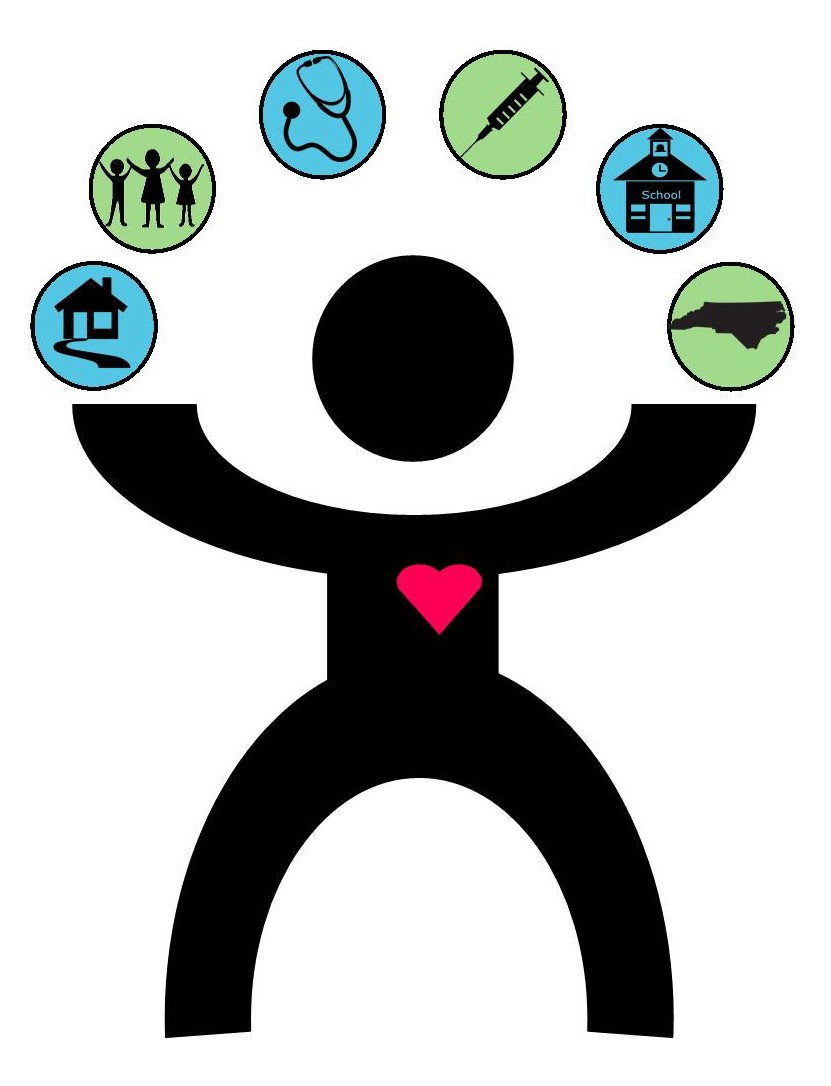ABOUT NC PUBLIC HEALTH NURSING
What is Public Health Nursing?
Public health nursing is the practice of promoting and protecting the health of populations using knowledge from nursing, social and public health sciences.
Source: APHA, Public Health Nursing Section. (2013). The Definition and Practice of Public Health Nursing.
Ten Ways Public Health Nurses Improve Health

Prevent
PHNs work inside and outside clinic walls to prevent conditions such as obesity, diabetes, injuries, school absenteeism, infant mortality, and spread of communicable diseases.

Educate
PHNs educate individuals, families, communities and stakeholders about healthy behaviors, environments, and policies that make the healthy choice the easy choice.

Coordinate
PHNs coordinate and integrate care and services across the lifespan to improve individual and population health outcomes, improve health equity and reduce cost.

Protect
PHNs protect people by educating about environmental hazards, preparing for emergencies and mobilizing during disasters.

Lead
PHNs lead evidence-based quality practice and policy changes. They lead cross-sector and transdisciplinary collaborations that impact communities.

Promote
PHNs promote health equity and health as a shared value through individual and community engagement and inclusion.

Advocate
PHNs advocate for community assets that lead to healthier people such as safe and affordable housing, healthy school meals, tobacco prevention, safe places to walk/bike, appropriate behavioral health treatments, and trauma-informed care.

Care
PHNs care for people, families, and communities. They understand the importance of culture, language, literacy, and how these shape health, well-being, and equity.

Integrate
PHNs recognize that health is a function of physical, mental, emotional and spiritual well-being. They assist individuals and communities in integrating a variety of needed services through collaborating, mobilizing and leading interdisciplinary teams, partners and consumers.

Research
PHNs use research to inform their practice and do research to improve health of the individual, family and community.
Download the "Ten Ways" Print-out
Source: https://www.mahoninghealth.org/ten-ways-public-health-nurses-improve-health/
Principles of Public Health Nursing:
Public health nursing is unique within the discipline of nursing because of its adherence to all the following principles:
1. The client or “unit of care” is the population.
2. The primary obligation is to achieve the greatest good for the greatest number of people or the population as a whole.
3. Public health nurses collaborate with the client as an equal partner.
4. Primary prevention is the priority in selecting appropriate activities.
5. Public health nursing focuses on selecting strategies that create healthy environmental, social and economic conditions in which populations may thrive.
6. A public health nurse is obligated to actively identify and reach out to all who might benefit from a specific activity or service.
7. Optimal use of available resources and creation of new evidence-based strategies is necessary to assure the best overall improvement in the health of the population.
8. Collaboration with other professions, populations, organizations and stakeholder groups is the most effective way to promote and protect the health of the people.
Source: American Nurses Association. (2013). Scope and Standards of Practice: Public Health Nursing, 2nd ed.; Nursebooks.org, Sliver Spring, MD.
Interested in learning more about the Nursing Model? Susan Little explains this 3-minute informational video, “The synergistic relationship of the Medical Model and Nursing Model in NC Public Health.”
North’s Carolina’s local health department nurse-driven
model of providing public health services.
In North Carolina, PHNs have been at the core of public health providing care for individuals, families, and communities prior to the evolution of clinical services that we now embrace as standard in North Carolina public health departments. PHNs then and now provide screenings for chronic disease, cancer, sexually transmitted disease, wellness assessments for children, prenatal, post-partum and newborn home visits, case management, nutrition education, and an array of other educational and prevention services all on our license as a registered nurse. Some of the services PHNs provide require standing medical orders, but most do not.
North Carolina Public Health has always operated on a nurse-driven model (practice models/theories that emphasize the more holistic approach to disease) vs. the medical model (focused on the physical and biologic aspects of specific diseases and conditions) and continue to operate this way today despite the addition of comprehensive primary care and other specialty medical services in many of our health departments.

